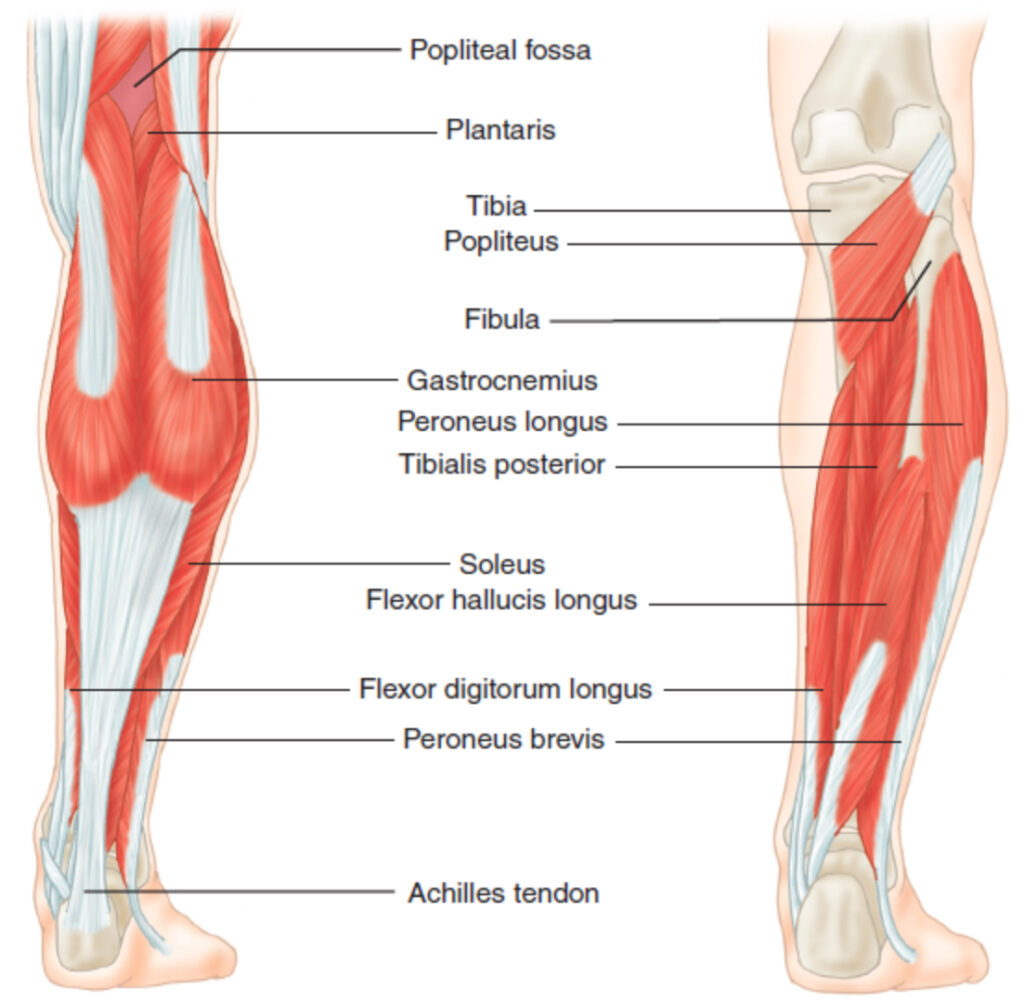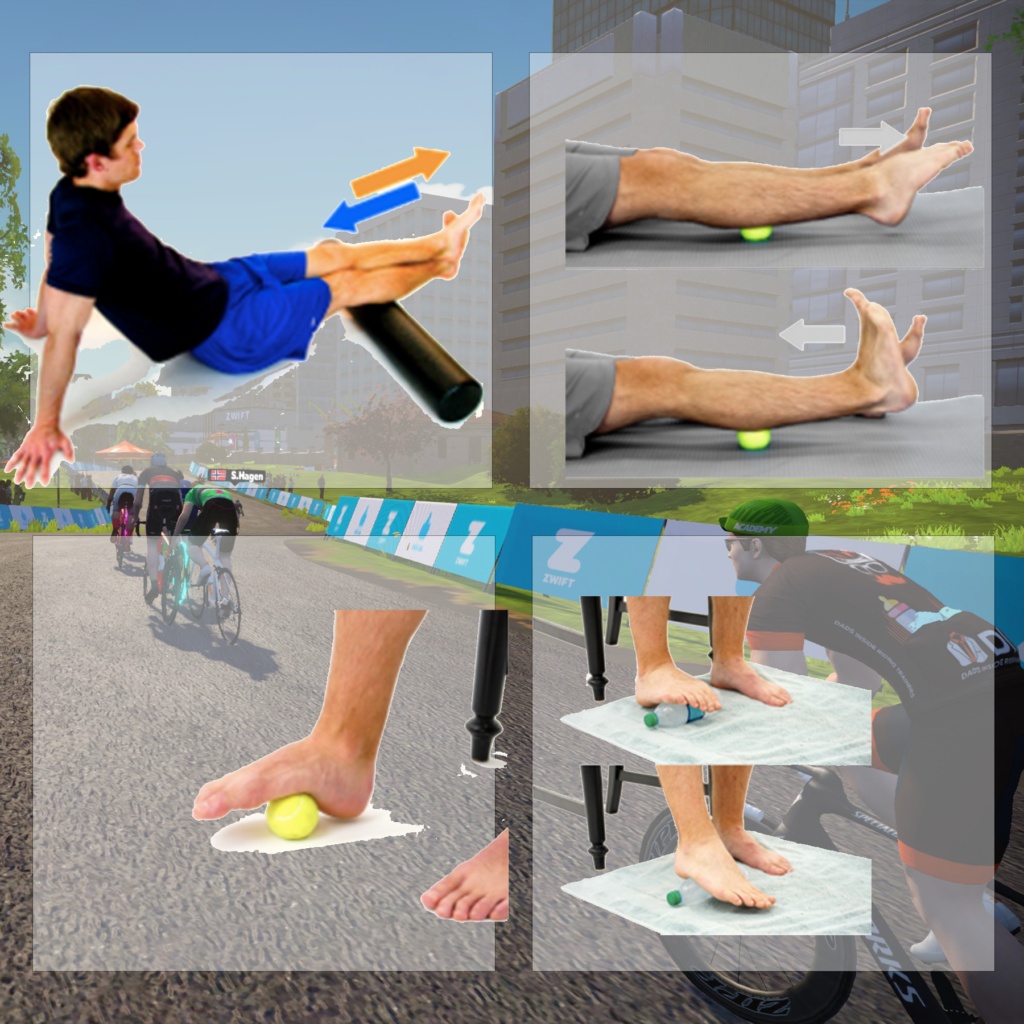The majority of cycling injuries are overuse injuries which develop gradually over time due to repeated movement patterns. In a 2012 study, researchers investigated the cycling habits and injury history of 397 cyclists and determined that nearly 54% suffered from foot pain, often requiring them to stop and remove their shoes to relieve the discomfort.
“Cyclists interface with the bike at three different points: the handlebars, the saddle, and the pedals. Of these three contact points, the greatest forces experienced by cyclists are those at the pedals, where large forces have to be applied to transfer power, particularly during intense efforts like sprinting and hill climbs”.1

Ankle and Foot Pain Complaints and Injuries
Achilles Tendinitis
“The Achilles tendon, also known as the heel cord, is a tendon on the back of the leg that attaches the calf muscles to the heel (calcaneus) of the hindfoot. Overuse and poor technique can aggravate the Achilles tendon, causing pain and swelling over the hindfoot known as Achilles tendinitis.” 2
Plantar Fasciitis
“The plantar fascia is a thick band of tissue that runs across the bottom of your foot and connects your heel bone to your toes. Plantar fasciitis causes a sharp heel pain that is caused by repetitive irritation to the plantar fascia” 2, usually greatest upon your first steps in the morning. Chronic fasciitis can result in a calcific deposit upon the fascial insertion to the calcaneus known as a heel spur.
Numbness in the Foot
Described as “pins and needles” this discomfort is caused by compression of the nerves that provide sensation to the foot and is most commonly experienced on the top of the foot and big toe.
Metatarsalgia
Pain localized to the ball of the forefoot that is brought about in cyclists by repeated stress during pedaling.
Immediate First Aid for Acute Injuries
The PRICE principle, an acronym which stands for Protection, Rest, Ice, Compression, and Elevation, is the standard for the treatment of sports injuries during their initial phase of discomfort. It should be applied as soon as possible for 24-72 hours.
Basic Bike Fit Recommendations
- Achilles tendinitis: “Move the cleat back on the shoe so that the ball of the foot is more forward on the pedal, raise saddle height, address a limb length discrepancy with appropriate shim, decrease resistance and increase cadence.” 3
- Plantar fasciitis: “Raise saddle height, move the cleat back towards the heel, address a limb length discrepancy with appropriate shim.” 3
- Numbness: “Improper shoe fit and overtightened straps may bring about numbness, so it is important for riders to invest in properly-fitting shoes and loosen their straps.” 2
- Metatarsalgia: Cyclists should be wary of pedaling with excess resistance, poorly positioned cleats and feet, and rigid cycling shoes, all of which may cause metatarsalgia. Soft-soled shoes or a soft insert may help decrease pressure and reduce symptoms.

Shoe Fit Suggestions
- Cycling shoes should be selected to allow adequate width and support, especially in the forefoot area which could swell during long rides or in warm weather.
- A stiff (carbon) shoe is acceptable provided that the footbed is properly structured and contoured to help relieve uneven pressure.
- Avoid excessive and uneven tightening of shoe straps.
- Cyclists who use clipless pedals should receive guidance on proper individualized cleat positioning and ensure adequate rotational freedom or “play” during the pedal motion.
- Encourage cyclists who suffer with foot pain to take frequent breaks, choose flatter routes, and pedal at a higher cadence.
Active Treatment Plan For Ankle and Foot Pain
What follows will be the foundation of a solid cycling injury active treatment and prevention plan, beginning with the basics of flexibility, strength, and recovery with a focus on the feet and ankle joint.
By completing all elements of the program, and building upon it with each installment of the series, you will be equipped to withstand the physical stress of cycling with less pain and greater enjoyment in addition to having a resource to refer to when symptoms necessitate.
Flexibility Exercise of the Ankle and Foot
Find The Zwift Insider Foot & Ankle Flexibility Program complete with exercise descriptions >
Static Stretching Tips
- Go to point of stretch and hold for 15-30 seconds
- 3 repetitions per exercise
- Don’t bounce!
Strengthening Exercise of the Foot and Ankle
Find the Zwift Insider Foot & Ankle Strengthening Program complete with exercise descriptions >
Strength Training Tips
- Perform 3 sets of 15 repetitions to start
- Don’t perform if experiencing severe sharp pain (PRICE)
- Increase intensity by adding weight or increasing repetitions
- Strict form is essential!
Foam Roll Recovery Techniques
Find the Zwift Insider Foot & Ankle Foam Roller Program >
Foam Rolling Benefits and Technique
- Improves circulation to enhance muscle recovery
- Relieves muscle tension to improve flexibility
- Roll slowly and when you find a tender spot, focus in on it by rolling back and forth until you feel it soften or release
The Follow-Up Appointment
Stay tuned, as in the next edition of this series I will provide a follow-up to the lumbar installment. We will examine core strengthening and the importance of spinal strength and stabilization to keep you riding, training, and racing at your best!
What about you?
Is there anything special or unique that you do which helps to keep your feet comfortable while in the saddle for long rides? Let us know what works for you!
- Frustrating foot pain in cyclists? These 7 treatment strategies can help! (Sports Injury Bulletin)
- Common Foot & Ankle Cycling Injuries (HSS)
- Cycling: Foot and Ankle Injuries (Dr. Douglas Goforth, DPM)





